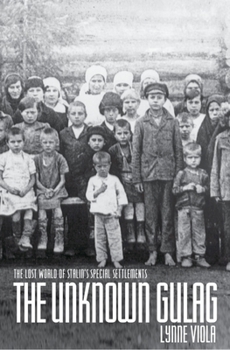The Unknown Gulag: The Lost World of Stalin's Special Settlements
Select Format
Select Condition 
Book Overview
One of Stalin's most heinous acts was the ruthless repression of millions of peasants in the early 1930s, an act that established the very foundations of the gulag. Solzhenitsyn barely touched upon this brutal episode in his magisterial Gulag Archipelago and subsequent writers passed over the subject in silence. Now, with the opening of Soviet archives, an entirely new dimension of Stalin's brutality has been uncovered. The Unknown Gulag is the first...
Format:Paperback
Language:English
ISBN:0195385098
ISBN13:9780195385090
Release Date:February 2009
Publisher:Oxford University Press
Length:320 Pages
Weight:1.00 lbs.
Dimensions:0.9" x 5.7" x 8.8"
Customer Reviews
3 ratings
Before the Gulag
Published by Thriftbooks.com User , 16 years ago
We well know that, before the Gulag, there was Solovki. But, as Viola shows, between Solovki and the Gulag there were the spets - poselki (special villages) built by two million peasant kulak in 1930 and 1931, after they were forcibly removed from their villages and dropped in remotest Siberia without food or shelter. Some half-million souls died in these deadly precursors to the Gulag, whose existence was defended as a State Secret until recently - long after the crimes of the Gulag had been well chronicled by Solzhenitsyn and others. Thank fully, there are tenacious researchers like Viola bringing such things to light, honoring the victims in a society that seems determined to forget. (Reviewed in Russian Life)
Shocking and brutal; a time when evil reigned
Published by Thriftbooks.com User , 17 years ago
I got interested in the subject of the gulag by reading a book called "Cannibal Island" which told the horrifying story of one settlement in the gulag. This book is a more scholarly and detailed examination of the gulag. It is a truth "that was suppressed for nearly sixty years, locked in Soviet archives and buried in the memories of frightened survivors" (p 2). The communist party, and Stalin in particular, declared war on the kulak class during the 1930's. A kulak was a slang word for a tightfisted person, and the communists were certain that the country would flourish if only they could be rid of those peasants who hoarded food and goods. In fact, the country was in a state of chaos and the people who were branded kulaks were as likely to be already starving as hoarding anything. Yet, "In the violent context of the First Five-Year Plan, the countryside became a foreign country to be invaded, occupied, and conquered" (p 32). Millions were swept up, wrenched from their families and their land, sent in over packed trains to the gulags. And millions died. Typhus and smallpox, exhaustion and starvation claimed the poor peasants who were sent to the gulag. In their desperation, many tried to escape the gulag, only to perish in the vast emptiness of Siberia. Some rebellions occurred, and were swiftly put down. The dry reports from those in charge make for grim reading, containing such statistics as half of the women had ceased to menstruate due to hunger (p 133).
Excellent scholarly work on the lost gulag
Published by Thriftbooks.com User , 17 years ago
Gulag is the abbreviation for the vast agglomeration of prisons, penal camps and settlements that held the millions of citizens the Marxist/Leninist Communists enslaved. This scholarly work covers the establishment of the settlements populated by the expropriated "kulaks" -- rich peasants, the definition of which changed constantly. Millions of people, mostly entirely families, denounced as enemies of the socialists were arrested because they owned a cow, a tractor, had employees, had more goods than a neighbor, were simply disliked or because a Communist functionary needed to meet a quota. They were forced into box cars without adequate food, water or sanitation and sent hundreds or thousands of miles away into exile. Thousands died enroute, still more thousands were executed. And many more thousands died when they were forced to labor in forests, mines and on primitive farms in the name of socialist glory. Lynne Viola has conducted extensive research, including many hours in the formerly sealed archives of the security organs. Her unadorned prose is all the more horrifying: "The survivors noted that the people whom Soviet sources labeled non-able-bodied and who some of the bosses called "ballast" were the most vulnerable during the famine." There are extensive quotes from the letters of the exiled, letters which of course were confiscated by the socialist authorities. There are excerpts from the endless reports of the bureaucrats who spent enormous time blaming others for their failures to extract more work from their slaves. Most people will be unable to tolerate reading "The Unknown Gulag". It is not likely to find favor among the left-wing who prefer to pretend that socialism didn't kill and enslave hundreds of millions of people in Europe, Asia and Africa. For the few who can deal with the truth, Lynne Viola has performed a great service. Jerry






